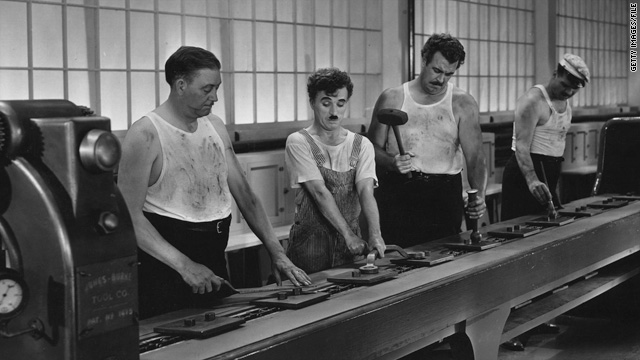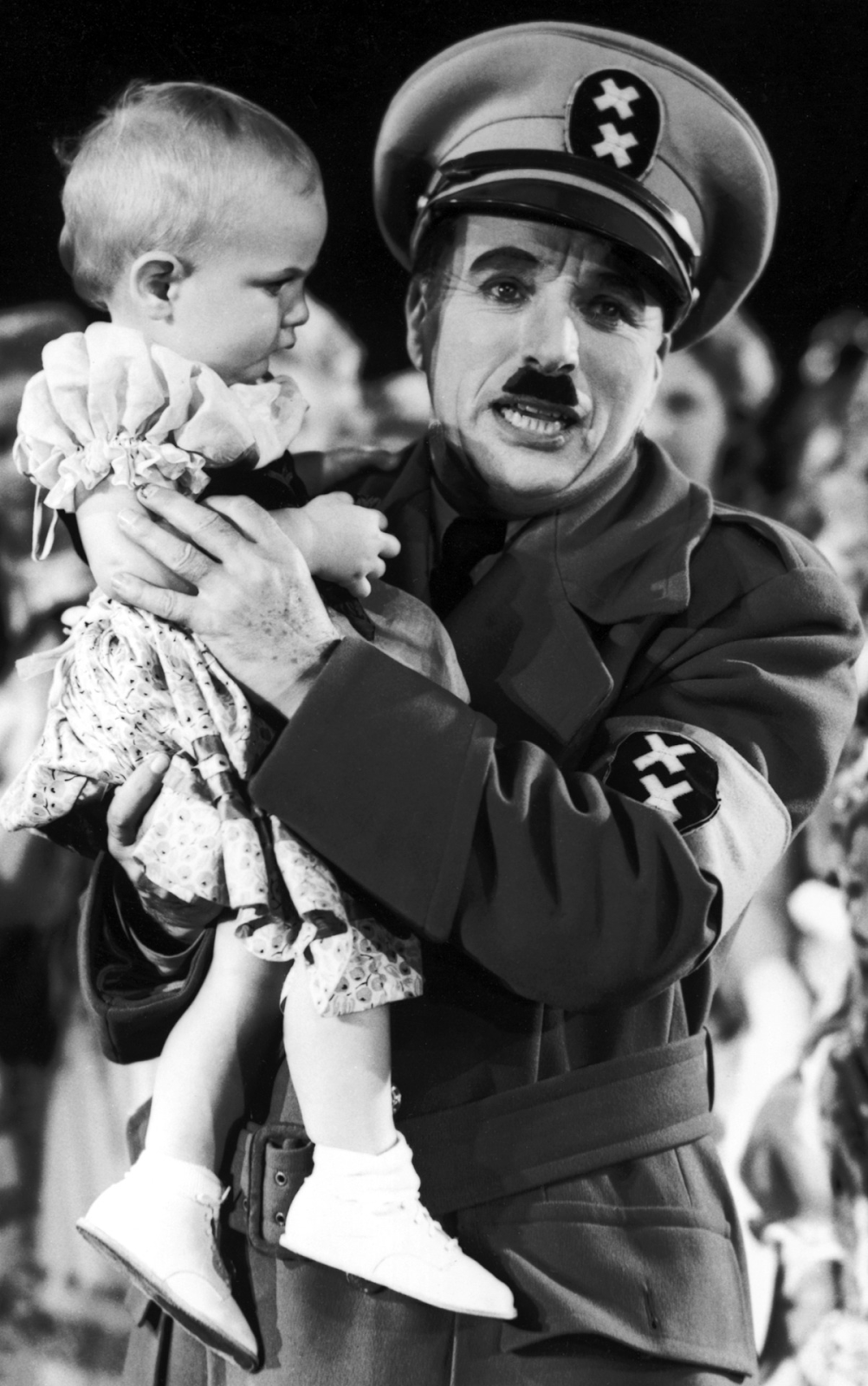Hello Readers, in this Bridge course Thinking activity Blog I am writing down here about my understanding of the Zeitgeist of the 20th Century: From Modern Times to the era of Great Dictators. This task is given by Dr. Dilip Barad sir, Department of English Maharaja Krishnakumarsinhji Bhavnagar University.
Frame Study on The Modern Times and The Great Dictator
Charlie Chaplin(1889-1977)
Charlie Chaplin, by name of Sir Charles Spencer Chaplin. British comedian, producer, writer, director, and composer widely regarded as the greatest comic artist on the screen and one of the most influential figures in motion-picture history. He was one of the greatest and most widely loved silent movie stars. he made many of the funniest and most popular films of his time.
We have watched his movie for Understanding of The Setting in the 20th century.
The Modern Times-
"The Modern Times" Movie was released in 1936 Which was written and Directed by Charlie Chaplin. This movie is Silent Black and White movie.
In the movie Charlie's criticism of Taylorism/capitalism through humor relevant for any age, nationality, or time; story-telling that would touch anyone alike in a universal fashion, every now and then sparkled with Chaplin's unique and profoundly influential sense of humor and on-screen comedy.
Frame- 1 Capitalism
At the beginning of the film, Charlie Chaplin implements one important Metaphor; the comparison between modern humans and domestic animals.
First, we see a shot of a stacking sheep being guided by something, and then next we see a shot of a modern human leaving some public transport station. Just like the sheep, humans are now part of a system. Domestic animals obey their masters, while modern humans have to obey "The new system". The idea that Chaplin gives us of this “modern” human is the loss of freedom, modern human acceptance of being part of a system in which the majority is abused and controlled by the minority.
There is a clear parallelism, and it would be easy to translate the visual scenes into a worded description. It is as if these two scenes were verbally stated: “The workers crowd into the building like a herd of sheep.” Or “Our society is being herded into ideals, but ultimately we are sheep”
Frame - 2 Rich Poor (Workers) Divide and Mechanization
In The Movie Modern Times, a clear example of this inequality and racism classes is shown. The chief, who demanded many disciplines from his employees, is only interested in growing your business. He interrupted recess and was about to remove the “lunchtime”. Interested in being better than the competitor, the boss chose Chaplin for a new machine evaluation. Here we can compare the modern worker to a dependent domestic animal, accepting what the master says, with no right of choosing or making their own decisions. Finally, the experiment fails, leaving Chaplin injured and confused.

I see language is used here in Charlie Chaplin’s film to represent order and absolute power. Voice is used when the president gives an order to factory workers. The president’s voice represents rigid rules and strict orders in the film. On the other hand, Charlie’s silent pantomime contradicts the presence of language. I think that the reason why there is no voice and word for workers including Charlie is it represents the opposite side of rational order. It, also, doesn’t have any power.
The president of the factory is sitting on a chair and seems chilly while working. The only thing he does is try to make more profit out of his workers by increasing work efficiency which is ridiculously harsh. On the other hand, factory workers including Charlie are working like machines while standing. Workers are kept watch by the president and receive orders from the president through the radio.
Man and Machine are treated in the same way in the film because both exist to make profits for the factory owner. The salesman tries to sell the new machine that is invented to help workers to eat while working. This would result in increasing work efficiency because workers do not have to stop working that lunchtime. Therefore, I believe the only thing in the factory valued was profits.
Frame - 3 Hunger
We see that the Gamin must steal bananas to feed her family and that their family dinner consists only of those bananas. Later, she meets the Tramp while trying to steal a loaf of bread to feed herself. In prison, the Tramp hardly gets anything to eat, but it is better than nothing, so he tries to return—because at least there he won't starve to death. We can also clearly see how much more the wealthy have, to a point that is excessive, while the poor have almost nothing. These divisions come out clearly earlier as well, when the Gamin tries to steal the bread and a wealthy woman in fine clothes, who cannot understand the Gamin’s struggles, gets her in trouble.
Frame- 4 Waiting for new problems and facing all
This movie shows how difficult it is for the majority to have a “perfect” life under capitalism. Chaplin captures the despair of the lower classes, nothing but the reality that people live in those days. He also captures the value of perseverance and tolerance at the end of the film. The final image is him and his couple walking in a straight line. Waiting for new problems to confront and overcome, and facing all those changes that bring the modern times.
The Great Dictators-
The Great Dictator is a 1940 political satire film written, produced, and starring world-renowned actor and comedian, Charlie Chaplin. This was Chaplin’s first true sound film and wound up being his most commercially successful film. The film was nominated for several awards, including five Academy Awards.
Frame- 5 Behaving like king hearted
From the Crowd He took one child and he want to see the people how he was a lovely and warm-hearted person. At the current time, we saw other political people who also played with children and saw how they are kind-hearted.
This Frame saw how Dictator's Behaviour toward the Jews and his soldiers always annoys them for no reason and no fault.
Frame- 7 I'm the king of the world
The Dictator wants to rule over the whole world and he plays with a world map ball like a balloon.
Frame- 8
During the Oakie scenes, we get many of the film's most famous comedy moments: the futile attempt to seat Napoloni on a very low chair, so Hynkel can tower over him; the negotiations during the banquet, when Hynkel says he will destroy his enemies just like this and attempts to rip apart a handful of spaghetti, but can't, and of course the classic barber-chair scene, in which each dictator tries to pump himself higher than the other.
Frame-9 Rhetorical Speech
The Great Dictator’s famous climax finds these two men merging, somewhat, into one. It’s a rousing speech ostensibly delivered by the Jewish barber, who has been confused for Hynkel by the Nazis and is called upon to speak to the masses. And then he opens his mouth and the man that emerges is Chaplin himself, creeping beyond the boundaries of character, satire, or even the artificial construct of a "movie," as such.
The speech makes a case for humanity in the face of grave evil. "We think too much and feel too little," Chaplin says. "More than machinery we need humanity. More than cleverness we need kindness and gentleness." You’ll recognize this theme-"more than machinery we need humanity"—throughout Chaplin’s work, and it rings especially true here. Chaplin emerges, fully human, as himself, breaking free of the film’s satirical trappings, to deliver one from the heart.
Throughout the speech, Chaplin’s character frequently uses comparisons of values, things, and outcomes. He flawlessly delivers these comparisons that invoke a sense of logical thinking as it forces the listener to envision the different scenarios he depicts and draw their own obvious conclusion.
Frame- 10
Hannah, now an impoverished laborer in a vineyard in Osterlich, hears the barber's speech on the radio, and is amazed when the Barber addresses her directly: "Hannah, can you hear me? Wherever you are, look up, Hannah. The clouds are lifting. The sun is breaking through. We are coming out of the darkness into the light. We are coming into a new world, a kindlier world, where men will rise above their hate, their greed, and brutality. Look up, Hannah. The soul of man has been given wings, and at last, he is beginning to fly. He is flying into the rainbow into the light of hope, into the future, the glorious future that belongs to you, to me, and to all of us. Look up, Hannah. Look up!" As she rises, Mr. Jaeckel asks Hannah, "Hannah, did you hear that?" The girl silences him with a gesture, saying, "Listen," and turns her face, radiant with joy and hope, toward the sunlight.
[Word count- 1500]

























No comments:
Post a Comment